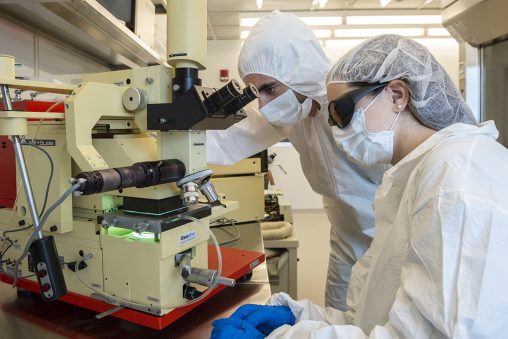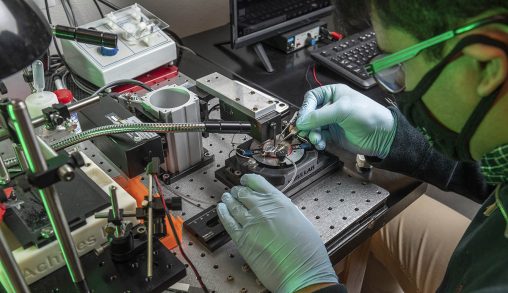
Wright State is one of 11 research institutions in the Midwest Regional Network to Address National Needs in Semiconductor and Microelectronics, which was formed in response to plans by Intel Corporation to build two chip factories near Columbus.
Wright State University has collaborated with a group of leading research institutions from Ohio, Indiana and Michigan to launch a new network to support the semiconductor and microelectronics industries and address their research and workforce needs in Ohio.
The Midwest Regional Network to Address National Needs in Semiconductor and Microelectronics was formed in response to plans by Intel Corporation to build two chip factories near Columbus.
The network was also formed to help address the broader national efforts to promote U.S. leadership in semiconductors and microelectronics.
Wright State President Sue Edwards, Ph.D., said, “Wright State University is privileged to join the network as we work to leverage the immense talent pipeline of the Midwest region and bolster world-changing research programs in support of Intel and its many suppliers. Wright State looks forward to supporting new semiconductor research in Ohio as we work to become an integral part of U.S. semiconductor manufacturing leadership.”
The network will leverage its members’ existing research, curricular and experiential-learning initiatives, capabilities and expertise to support a national effort to expand semiconductor and microelectronics innovation and supply chain ecosystems in the United States.
The network includes Wright State, Columbus State Community College, Lorain County Community College, Michigan State University, Ohio State University, Purdue University, Sinclair Community College, University of Cincinnati, University of Dayton, University of Michigan and the University of Notre Dame.
Each institution’s president recently signed a memorandum of understanding to form the network, which is expected to grow beyond these initial institutions.
Wright State has been working in the areas of digital microelectronics, smart manufacturing and industrial engineering, integrated circuit design and semiconductor technologies for many years in response to the needs of the region’s workforce.
“Wright State is ready to address the research and educational needs of the growing semiconductor and microelectronic industries while also helping students prepare for new career opportunities those industries will offer,” said Madhavi Kadakia, Ph.D., vice provost for research and innovation at Wright State. “We currently have strong research thrusts in the areas of semiconductor manufacturing and microelectronics and are already invested in building future areas of research such as quantum computing and cybersecurity.”
The institutions participating in the network will work together to develop a common infrastructure that can identify and share expertise and facilities to make it easier to collaborate, said Subhashini Ganapathy, Ph.D., professor and chair of the Department of Biomedical, Industrial and Human Factors Engineering at Wright State.
“Ohio is well-positioned to support Intel and the regional network because of the state’s existing infrastructure that supports manufacturing-related activities,” she said.
Ganapathy is serving as chair of Wright State’s Intel Initiative, an effort to establish a long-term relationship with Intel and align academic programs across the university to help provide a skilled workforce for Intel and their associated industries and expand opportunities for students.
One focus of the university’s Intel Initiatives, Ganapathy said, is to help students participate in internships, co-ops and other roles to get hands-on experience with Intel. Many graduates from the College of Computer Science and Engineering have been hired at Intel.

Subhashini Ganapathy, professor and chair of biomedical, industrial and human factors engineering, is chair of Wright State’s Intel Initiative.
Wright State has several ranked programs and numerous research capabilities to support students and research related to the semiconductor and microelectronics industry.
“Beyond our existing degree programs, the College of Engineering and Computer Science has been prioritizing research and workforce development in the areas of digital microelectronics, integrated circuit design and semiconductor technologies for years in response to regional workforce needs, especially for our collaborators at Wright-Patterson Air Force Base and local industry partners,” said Brian Rigling, Ph.D., dean of the College of Engineering and Computer Science.
In 2020, Wright State led a consortium of six Ohio institutes in the establishment of the Assured Digital Microelectronics Education and Training Ecosystem (ADMETE), which has received more than $13 million in support from the Air Force Research Laboratory. The goal of ADMETE is to develop a pipeline of trained undergraduate engineering students with the skills to design and develop digital microelectronic devices and systems.
“Under the program, we have been establishing shared curriculum and a collaborative educational model for undergraduate students in the area of digital microelectronics design,” Rigling said.
The Department of Biomedical, Industrial and Human Factors offers programs focused on smart manufacturing, supply chain and logistics as well human factors engineering and data science and analytics. U.S. News ranked Wright State’s graduate Industrial and Human Factors Engineering Program No. 30 among all online engineering programs in the nation for 2022.
“We teach students how to use data and interpret data in a meaningful manner, which is very important in any kind of manufacturing problem,” Ganapathy said.
Programs in the departments of Mechanical and Materials Engineering and Computer Science and Engineering train undergraduate and graduate students for careers in advanced manufacturing, additive manufacturing, automation, big data and data science.
The Department of Mechanical and Materials Engineering offers several courses to help students develop a skillset that is important for the semiconductor industry. Topics include electronic packaging design and assembly, reliability, metrology and quality assurance, semiconductor materials and material characterization. Faculty members work closely with the Air Force Research Laboratory and local industry in areas related to semiconductor processing and package design, including innovative materials for interconnects, additive and lithography processes, and reliability assessment of packages.
This fall, the Lake Campus will begin offering an Associate of Applied Science in Mechatronics and Industrial Engineering through the College of Engineering and Computer Science.
“The program is a perfect fit for a student who is interested in learning about mechatronics and industrial engineering so they can work in semiconductor processing,” Ganapathy said.

Wright State is prepared to address the research and educational needs of the semiconductor and microelectronic industries and help students prepare for new career opportunities with those industries.
The Department of Physics offers a course in Microfabrication Sciences, which is taught using the cleanroom facilities in the Neuroscience Engineering Collaboration Building. The course focuses on hands-on experience with microfabrication tools and techniques and the underlying scientific principles, which are used in semiconductor manufacturing.
Physics faculty and students are also conducting valuable research on microfabrication and the study of surface structured plasmonic, a type of “metasurface” component. The research has resulted in a Wright-State-owned U.S. utility patent, “THz distributed detectors and arrays,” which is garnering interest because of its unique integration of metasurface structures with semiconductor devices.
The College of Liberal Arts offers undergraduate and graduate degrees in professional and technical writing, training students with the skills needs to translate complex information and create manuals, instructions and other forms of communications for industrial, manufacturing and engineering firms.
Students interested in careers analyzing and interpreting data or coordinating the flow of materials, finances, and information within and between companies can pursue undergraduate and graduate degree programs in management information systems and logistics and supply chain management in Wright State’s Raj Soin College of Business.
Wright State’s online Master of Information Systems and Master of Science in Logistics and Supply Chain Management Program were U.S. News’ highest-ranked programs in Ohio for 2022.
“Intel’s semiconductor manufacturing in Ohio will help secure the country’s chip supply chain and attract talent in traditional as well as innovative business domains,” said Thomas Traynor, Ph.D., dean of the College of Business. “The Raj Soin College of Business is committed to our partnership with Intel in educating, recruiting, retaining and developing talent through our successful programs such as Logistics and Supply Chain Management, Business Analytics and the MBA.”

 Wright State psychology team studies ways to identify fatigue in pilots, drivers
Wright State psychology team studies ways to identify fatigue in pilots, drivers  Wright State videographer Kris Sproles wins Regional Emmy and Ohio journalism award
Wright State videographer Kris Sproles wins Regional Emmy and Ohio journalism award  Wright State Boonshoft School of Medicine ranked among the nation’s best for 2024 by U.S. News
Wright State Boonshoft School of Medicine ranked among the nation’s best for 2024 by U.S. News  Exposing biotechnology
Exposing biotechnology  Wright State faculty member Dan Noel uses unique background to inspire new leaders
Wright State faculty member Dan Noel uses unique background to inspire new leaders 